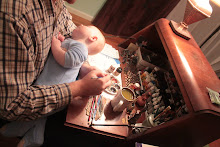| No, not this guy |
In D&D, Paladins have a long list of bonuses. They can Lay on Hands to heal 2 hitpoints once a day, they can cure disease, detect evil, have a protection from evil power, and get a +2 to tall saving throws. They can turn undead at level three, and cast clerical spells at level nine. Oh, and they are immune to disease as well.
Pretty powerful no? However, they have some pretty massive restrictions to offset these advantages. First, they have to have Charsima 17, which, well wow, that is high. Second, they can not participate in any "evil" acts, or they will lose all of their powers. They have restrictions on their allowed possessions, and must tithe 10% of earnings. Even with these restrictions, some DMs do not like Paladins, and some game universes simply do not allow them.
In the Deepest Sea setting, there are paladins, mainly from two sources. The first are warrior priests of the Red Daughter Bella, the Elvish Goddess of war. These are priests in terms of hierarchy, but they more closely fit in with paladins. They accompany the armies of the Empire and its allies, and seek to bring glory to their god through battle. They may be male or female, and have a red cloak to denote their authority. These warrior priests are not likely to be PCs.
The second source of Paladins is from the crusader kingdom Candia. A combined army of the Nordic nations under the command of the brilliant St. Cuthbert went on a crusade against the Orcs. This force of knights landed on the north side of the Deepest Sea, and struck the Orcs there, ending their long war against the Elves. They built a fortress city on the bay of Candia, starting with a prebuilt castle brought in pieces from Brémdy. The order of Cuthbert was founded shortly after the death of the Saint, and knights who took the vow of Cuthbert became known as Paladins. They strike out from the city after they are ordained, and seek adventure and right the wrongs of the world. They predominantly work north of the Deepest Sea, fighting the Orcs as they can, but the long relative peace there has caused political pressure for the order to send them somewhere else.
Members of the Order of St. Cuthbert have the following restrictions:
- Piety [must follow the Shepard]
- Respect the sanctity of life [only non-lethal damage to humans/Elves/havlings/dwarves, must attempt to heal all wounded (including orcs)]
- Poverty [may only keep enough coin to pay for their basic needs]
- Obedience [must obey their superiors in the order, or those nominated by the order]
- Chasity [may not have issue]
- Bravery [must be at the forefront of battle, otherwise act in brave ways]
- Protection of the weak [must defend the innocent and weak]
- Hate the Titanic [must destroy all Titanic artifacts, must shun those who openly speak Titanic]
In return Paladins get the powers listed in the Advance Companion, except they are not immune to disease. As members of the Order, they also have considerable "soft" power in the Nordic countries, which highly respect the order, and lesser "soft" power elsewhere. The order itself also has considerable resources to sponsor adventuring parties, or supply equipment, or otherwise help out a party containing a PC Paladin, of course in return for their goals.
NPC Human Paladins have a 9/10 chance of being male. 1/2 of the time they are nobles. In any random adventuring party, only 1/20 are likely to be Paladins. They are always heavily equipped, and are accompanied by d3-1 squires. 1/4 of them are aged 20-30, 1/2 are 31-40, and 1/4 of them are 40-60. 1/2 of them are from the two Nordic countries, 1/4 from all of the Latén countries, and the rest from all other human countries.
When handling Paladins in the game, remember all the control that players have surrendered in return for the benefits and prestige of being a Paladin. The character is a member of the Order of St. Cuthbert (or a priest of Bella), and must obey their superiors. This is in addition to any ties of family or fealty. These duties and obligation give a DM plenty of ways to provide carrots and sticks to the player of Paladin.
Wednesday, more Deepest Sea A-Z with Quaffs.


No comments:
Post a Comment